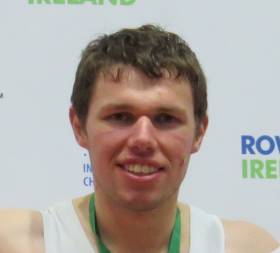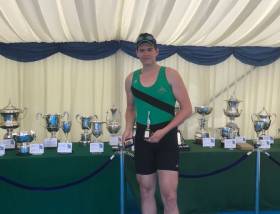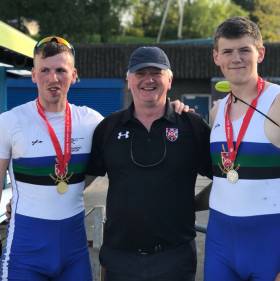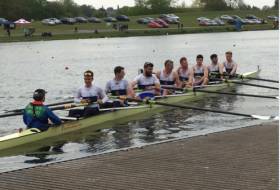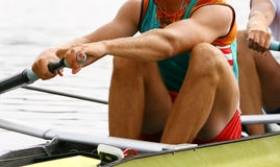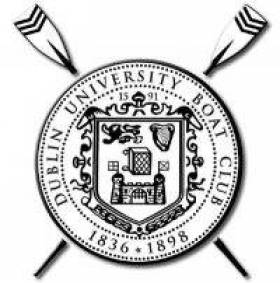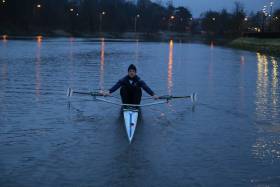Displaying items by tag: Queen's
NUIG and Enniskillen Shine at Irish Rowing Championships
#Rowing: NUIG had a very good first day at the Irish Championships at the National Rowing Centre, taking four titles.
They won the women's senior four, the women's intermediate eight and the women's club coxed four. Sadhbh O'Connor and Fiona Murtagh added the women's senior double sculls for the Galway club.
Enniskillen took two notable titles: their men's junior eight came through under pressure from Colaiste Iognaid, and the women's junior four won from Bann.
Fionnan Crowley retained his title in the men's senior single sculls. The Castleconnell man - a brother of Aileen, who was doing well in the Ireland pair at Rotterdam - won by under a length from Niall Beggan of Commercial, who came at him hard in the closing stages.
UCD's senior four also successfully defended their title.
Tom Kelly won the junior single - the first Championships for the Kenmare club. Kelly, who turns 17 next month, is coached by Noel Casey, who is 85. Casey as based in Britain for decades and coached British women's crews to the Los Angeles Olympic Games.
Carlow's Sadhbh Scully and Ciara Egan won the women's junior double - a first title at this level for the club.
Trinity won the men's club eight in a good race, while Cork Boat Club won the men's intermediate coxed four, and Anna Liffey the women's intermediate pair.
NUIG pushed Queen's hard in the men's novice coxed quadruple, but the Belfast men came through. The women's novice coxed quad from Queen's also won, giving them two victories on a busy day.
Queen's Shine at Lagan Scullers' Head of the River
#Rowing: Queen’s had a good day at the Lagan Scullers’ Head of the River in Belfast on Saturday. Sam McKeown was the fastest single sculler in the first head, and was most closely matched by three other men from his college club. Queen’s also had the fastest quadruple and double on the day.
Lagan Scullers’ Head, Saturday (Draft Results; selected)
Head One: 1 Queen’s (S McKeown; men’s senior single) 12 mins 15.8, 2 Queen’s (M Taylor, sen single) 12:49.7, 3 Queen’s (R Corrigan) 13:03.9; 5 Enniskillen RBC jun 16 double (T Murphy) 13:12.6, 7 Enniskillen jun 15 coxed quad (D Howe) 13:16.1; 15 Methody (C Purdy; jun 18A single) 14:13.8; 30 Bann (K Shirlow; women’s intermediate single) 15:06.3, 31 Belfast BC jun 18A women’s double (S Gordon) 15:07.8. 60 Coleraine GS (G Lenaghan; women’s jun 15 single) 16:36.6.
Head Two: Queen’s men’s sen quad (M Taylor) 11:01.3; 3 Methody men’s jun 16 quad (T Fleming) 13:08.1; 8 Enniskillen jun 18 double (J Timoney) 14:29.2; 9 Bann (A Christie; inter single) 14:31.1; 16 Belfast BC women’s jun 16 coxed quad 15:05.7; 19 Queen’s (R Smylie; women’s sen single) 15:28.3; 25 Belfast BC (L McCoy; women’s jun 18A single) 16:16.5; 27 Belfast RC (K Foster; men’s club two single) 16:24.8. 34 Carrick on Shannon women’s jun 15 quad 17:07.1. 36 Belfast BC women’s novice double 17:16.0; 42 Enniskillen (L Paton; men’s jun 15 single) 17:35.5. 51 Queen’s (C Hagan; men’s nov single) 18:30.4
Head Three: 1 Queen’s men’s sen double (H Moore) 12:30.4, 2 Enniskillen RBC jun 18A quad (J Timoney) 13:07.8; 7 Belfast BC women’s jun 18A quad (P Mullan) 14:13.3; 10 Methody men’s jun 18B coxed quad (A Waly) 14:31.0; 15 Carrick on Shannon (T Ó Donaile; men’s jun 16 single) 15:41.0, 16 Coleraine GS men’s jun 15 double (O Leitch) 15:41.9, 19 Belfast BC women’s jun 16 double (K Dick) 15:59.8; 40 Lagan Scullers’ women’s jun 15 double (E Darby) 17:04.4.
Irish Crews Amongst the Trophies Again at London Met
#Rowing: Philp Doyle of Queen’s and Ronan Byrne of UCC won the Championship Double and Sam McKeown of Queen’s the Championship Single on the second day of London Metropolitan Regatta at Dorney Lake today. Doyle and Byrne form part of the Ireland training group at the National Rowing Centre. Tristan Orlic of Neptune also took the junior 18 singles at Dorney. Commercial competed in the Challenge Eight and won a trophy.
London Metropolitan Regatta, Dorney Lake (Irish interest; selected results, winners unless stated)
Saturday
Men
Eight – Championship: 1 Leander 5:49.90, 2 Commercial 5:52.74.
Four – Championship: 3 Commercial 6:12.20. Tier Two: Shandon.
Four, coxed – Tier Three: Tribesmen 6:32.26. Academic, Tier Two: NUIG.
Pair – Tier Two: UCC 7:14.93.
Double Sculls – Championship: 2 UCC (R Byrne, H Sutton) 6:32.50. Tier Two: Castleconnell 6:42.50.
Single Sculls – Championship: 2 UCC (R Byrne) 7:03.99. Tier Two: Univ of Limerick (K Mannix) 7:18.36. Tier Three: St Michael’s (D O’Connor).
Women
Eight – Club, Tier Two: NUIG/Tribesmen 6:50.64. Academic, Tier Two: Trinity 6:57.77.
Four – Academic, Tier Two: Trinity 7:08.62.
Four, coxed – Championship: NUIG/Tribesmen 7:20.88. Tier Four: Univ of Limerick.
Pair – Championship: 2 Commercial (H O’Neill, R Morris) 7:46.57. Tier Two: NUIG 7:39.84.
Double Sculls – Championship: 3 London/Skibbereen (M Jackson, N Long) 7:28.48.
Sunday
Men
Four – Tier Four: UCC 6:47.80. Four, coxed – Tier Two: UCC 6:55.08.
Double – Championship: UCC/Queen’s (R Byrne, P Doyle) 6:28.43. Tier Two: UCC/Queen’s (Byrne, Doyle) 6:37.50.
Single – Championship: Queen’s (S McKeown) 7:11.67. Tier Three: Castleconnell (S Haugh) 7:29.95. Jun 18: Neptune (T Orlic) 7:53.76.
Women
Four, coxed – Tier Two: NUIG/Tribesmen 7:45.07. Tier Three: Univ of Limerick 7:49.44.
Pair – Tier Two: Cork 7:22.18.
Gold for Queen's University at BUCS Rowing Regatta
#Rowing: Queen’s University won the Championships Quadruple at the BUCS Regatta in Nottingham today. The crew of Nathan Hull, Sam McKeown, Philip Doyle and Tiernan Oliver beat Reading into second and Oxford Brookes into third. The Queen’s women’s Beginners’ eight took silver in their race.
BUCS Regatta, Nottingham (Selected Results; Irish interest)
Men
Sculling, Quadruple – Championship: 1 Queen’s (N Hull, S McKeown, P Doyle, T Oliver) 6:05.57, 2 Reading 6:08.22, 3 Oxford Brookes 6:10.22.
Women
Eight – Beginners’: 1 Edinburgh 7:15.28, 2 Queen’s 7:24.25.
Big Win for UCD's Crowley and Lambe At Rowing Championships
#Rowing: UCD’s Eimear Lambe and Aileen Crowley had an impressive win in the women’s senior pair in the deferred finals at the start of the third day of the Irish Championships at the National Rowing Centre. Skibbereen and Cork were in the touch with the UCD women until 1500 metres, but Lambe and Crowley left the rest behind from there and won by 10 seconds from Skibbereen.
Queen’s were also impressive in their win in the men’s novice eight, and Sanita Puspure won the senior single sculls with plenty to spare.
The junior 16 men’s eight went to Enniskillen, who thus completed the set of wins: the junior 18 and 16 eights for men and women.
Irish Rowing Championships, National Rowing Centre, Day Three (Selected Results)
Men
Eight – Novice: Queen’s 6:21.56.
Sculling, Quadruple – Junior: 1 Three Castles 6:21.53, 2 Shandon 6:22.75, 3 Clonmel 6:23.05.
Women
Pair – Senior: UCD (A Crowley, E Lambe) 7:37.41.
Sculling, Single – Senior: Old Collegians (S Pupsure) 8:02.64.
Queen's Take Multiple Medals at BUCS Regatta
#Rowing: Queen’s University, Belfast, had some excellent results at the British University (BUCS) Regatta at Nottingham. Their men’s crews won 11 medals including three golds. The Beginners’ eight and coxed four won, as did Miles Taylor in the men’s intermediate lightweight single sculls. Philip Doyle took silver in the men’s Championship single sculls and Sam McKeown matched this in the men’s intermediate single sculls. Taylor and Chris Beck teamed up to take silver in the Championship lightweight double, and the Championship and Beginners’ quadruples also took silver.
Lee's Cremen and Synott Take Division One Honours
#Rowing: Lee’s junior women won the Division One double sculls at the Skibbereen Regatta at the National Rowing Centre. Margaret Cremen and Claire Synott had already taken the Division One quadruple, in combination with Eimear Cummins and Maedbh Heaney. Queen’s won the men’s double and the men’s four, where they were involved in a two-boat race with UCC. The women’s four gave UCD the opportunity for an emphatic victory.
Skibbereen Regatta, National Rowing Centre, Cork, Saturday (selected results)
Men
Eight – Division Two – A Final: 1 Trinity A (novice) 6:18.4; 2 UCC (club two) 6:22.0; 4 Cork (jun 18B) 6:30.7. B Final: Shandon (jun 16) 6:33.9.
Four – Division One – A Final: 1 Queen’s (sen) 6:37.6, 2 UCC (sen) 6:44.1. Division One (coxed) – A Final: 1 NUIG (sen) 6:52.4, 2 Queen’s (club one) 6:56.1, 3 Trinity (club one) 6:56.9; 5 St Joseph’s A (jun 18A) 7:02.2. B Final: 1 UCC (inter) 6:58.4. Div Two (coxed) – A Final: 1 Cork BC (jun 18B) 7:12.8; 2 Commercial B (club two) 7:14.1. B Final: Presentation, Cork (jun 16) 7:37.1.
Pair – Division One – A Final: 1 Trinity (sen) 6:56.8, 2 Commercial A (sen) 7:00.0, 3 Commercial C (sen) 7:01.2; 5 UCC (inter) 7:11.3. B Final: 1 Trinity A (sen) 7:12.4; 4 Queen’s (club one) 7:27.1.
Sculling, Quadruple – Division One – A Final: 1 Shandon/Athlone (sen) 6:15.0, 2 Shandon (jun 18A) 6:16.1, 3 Commercial (jun 18A) 6:22.7. B Final: 1 Skibbereen (inter) 6:39.5; 2 Queen’s (club one) 6:46.1.
Double – Div One – A Final: 1 Queen’s (sen) 6:44.1, 2 Shandon/Clonmel (sen) 6:50.3, 3 Castleconnell (inter) 6:53.4. B Final: 1 Belfast BC (inter) 7:05.7. Div Two – A Final: 1 Carlow (jun 18B) 7:04.6; 2 Skibbereen (club two) 7:11.9. B Final: 2 Waterford (jun 16) 7:26.1.
Single – Div One – A Final: 1 Queen’s (P Doyle, sen) 7:18.2, 2 Clonmel (D Lynch; jun 18A) 7:18.5, 3 Queen’s (C Beck; lwt) 7:24.3; 4 Skibbereen (F McCarthy; inter) 7:26.4. B Final: 1 Garda (D Kelly; sen) 7:32.8; 5 UCC (D Synott; club one) 7:46.2. Div Two – A Final: 1 Carlow (O’Brien; club two) 7:41.8; 2 Lee Valley (C Cummins; jun 18B) 7:43.8; 5 Carlow (J Keating; jun 16) 7:58.0.
Women
Eight – Div Two – A Final: 1 UCD (club two) 7:02.8; 3 Shandon (jun 18B); 5 Col Iognaid (jun 16). B Final: 4 Trinity A (nov) 7:44.2. Four – Division One – A Final: 1 UCD (sen) 7:20.9, 2 Skibbereen (jun 18A) 7:34.9, 3 Trinity B (sen) 7:35.3.
Division One (coxed) – A Final: Commercial (inter) 7:36.9, 2 UCD (sen) 7:37.5, 3 St Michael’s (inter) 7:46.8; 4 Queen’s (club one) 7:55.8. B Final: 1 NUIG (club one) 7:44.3.
Pair – Div One – A Final: 1 Cork (jun 18A) 7:55.47, 2 UCC (inter) 8:08.1, 3 Queen’s (inter) 8:14.8; 4 Trinity (club one) 8:21.6.
Sculling,
Quadruple – Division One – A Final: 1 Lee (jun 18A) 7:20.4, 2 Skibbereen (jun 18A) 7:25.1, 3 Fermoy (club one) 7:27.3; 4 UCC (inter) 7:30.2, 5 Belfast BC, Queen’s, Fermoy (sen) 7:30.9. B Final: Commercial (jun 18A) 7:47.6. Div Two – A Final: 1 Cork A (jun 18B) 7:46.4; 2 Workman’s (jun 16) 7:49.0; 6 St Michael’s (club two) 8:15.6. C Final: 5 Univ of Limerick (nov) 8:56.2.
Double – Division One – A Final: 1 Lee (jun 18A): 7:42.4, 2 Neptune (jun1 18A) 7:50.3, 3 Trinity (inter) 7:54.4; 4 Skibbereen (sen) 8:10.5. B Final: 1 NUIG A (club one) 8:11.5.
Div Two – A Final: 1 Carlow (club two) 8:02.4; 2 Carlow (jun 18B) 8:08.6; 3 Workman’s (jun 16) 8:11.0.
Single – Div One – A Final: 1 Killorglin (M Dukarska; sen) 7:55.4, 2 Skibbereen (D Walsh; sen) 7:58.9, 3 Skibbereen (S Dolan; sen) 8:05.8; 4 Skibbereen (E Hegarty; jun 18A) 8:12.6, 5 UCD (A Crowley; inter) 8:20.4. B Final: 1 Skibbereen (O Hayes; lightweight) 8:27.7; 4 Belfast BC (O Blundell; club one) 8:32.8. C Final: 1 Garda (B Larsen; inter) 8:36.81.
Doyle Pips Lynch in Photo Finish at Skibbereen Regatta
#Rowing: Philip Doyle of Queen’s University beat Daire Lynch of Clonmel by three tenths of a second in the Division One A Final of the men’s single sculls at Skibbereen Regatta today. Monika Dukarska won the women’s equivalent, with lightweight oarswoman Denise Walsh second. Trinity took the men’s senior pair through Patrick Moreau and Michael Corcoran and their men’s novice eight won the Division Two A Final. Cork Boat Club won the women’s Division One pair with their junior crew.
Skibbereen Regatta, National Rowing Centre, Cork, Saturday (selected results)
Men
Eight – Division Two – A Final: 1 Trinity A (novice) 6:18.4; 2 UCC (club two) 6:22.0; 4 Cork (jun 18B) 6:30.7. B Final: Shandon (jun 16) 6:33.9.
Pair – Division One – A Final: 1 Trinity (sen) 6:56.8, 2 Commercial A (sen) 7:00.0, 3 Commercial C (sen) 7:01.2; 5 UCC (inter) 7:11.3. B Final: 1 Trinity A (sen) 7:12.4; 4 Queen’s (club one) 7:27.1.
Sculling,
Single – Div One – A Final: 1 Queen’s (P Doyle, sen) 7:18.2, 2 Clonmel (D Lynch; jun 18A) 7:18.5, 3 Queen’s (C Beck; lwt) 7:24.3; 4 Skibbereen (F McCarthy; inter) 7:26.4. B Final: 1 Garda (D Kelly; sen) 7:32.8; 5 UCC (D Synott; club one) 7:46.2. C Final: Portadown (S McKeown; sen) 7:25.0
Women
Pair – Div One – A Final: 1 Cork (jun 18A) 7:55.47, 2 UCC (inter) 8:08.1, 3 Queen’s (inter) 8:14.8; 4 Trinity (club one) 8:21.6.
Sculling,
Quadruple – Div Two – A Final: 1 Cork A (jun 18B) 7:46.4; 2 Workman’s (jun 16) 7:49.0; 6 St Michael’s (club two) 8:15.6. C Final: 5 Univ of Limerick (nov) 8:56.2.
Single – Div One – A Final: 1 Killorglin (M Dukarska; sen) 7:55.4, 2 Skibbereen (D Walsh; sen) 7:58.9, 3 Skibbereen (S Dolan; sen) 8:05.8; 4 Skibbereen (E Hegarty; jun 18A) 8:12.6, 5 UCD (A Crowley; inter) 8:20.4. B Final: 1 Skibbereen (O Hayes; lightweight) 8:27.7; 4 Belfast BC (O Blundell; club one) 8:32.8. C Final: 1 Garda (B Larsen; inter) 8:36.81.
#Rowing: Trinity emerged as the top college at the University Championships of Ireland at the National Rowing Centre today. The combined points total of women’s and men’s crews was 66, ten more than Queen’s University and 14 ahead of UCD. The Wylie Cup was won by NUIG by virtue of their wins in the men’s intermediate and club eights, while Trinity won the Bank of Ireland Cup for women. The men’s senior eights final again saw Trinity beaten by UCD, by half a length. The verdict in the women’s senior eight was the same – but the result was reversed.
University Rowing Championships, National Rowing Centre, Cork, Friday (Selected Results)
Overall: 1 Trinity (DUBC and DULBC combined) 66 points, 2 Queen’s University 56pts, 3 UCD 52pts. Wylie Cup (men): NUIG. Bank of Ireland Cup (women): Trinity.
Men
Eight – Senior: 1 UCD, 2 Trinity, 3 NUIG; ½ l, 3l. Inter: NUIG. Club: NUIG. Novice: Trinity A 2½ l.
Four, Sen: 1 UCC, 2 Trinity; canvas. Inter: NUIG. Club, coxed: UCC.
Pair – Sen: 1 UCD, 2 NUIG, 3 Trinity A; 6l, 6l.
Sculling, Quadruple – Novice, coxed: Queen’s. Double – Inter: Queen’s. Single – Senior: 1 Queen’s (P Doyle), 2 Belfast Met (S McKeown), 3 Queen’s (C Beck); 2 ½ l, ½ l. Inter: Cork IT (Hennessy).
Women
Eight –Senior: 1 Trinity A, 2 UCD, 3 Trinity B; ½ l, dist. Inter: Trinity. Club: Queen’s. Novice: UCD.
Four – Sen: 1 Trinity A, 2 UCD, 3 Trinity; ¾ l, dist. Inter, coxed: Queen’s. Club, coxed: Trinity A.
Pair – Sen: Trinity.
Sculling, Quadruple – Novice, coxed: Dublin IT A.
Double – Inter: Trinity A.
Single – Senior: IT Tralee (M Dukarska). Inter: UCC (Bouanane).
Doyle is Afloat Rower of the Month for February
#Rower of the Month: Philip Doyle of Queen’s University is the Afloat Rower of the Month for February. The big medical student was the fastest single sculler at the Lagan Scullers’ Head of the River. He covered the course in under 12 minutes and had just over 17 seconds to spare over Portadown’s Sam McKeown.
Rower of the Month awards: The judging panel is made up of Liam Gorman, rowing correspondent of The Irish Times, and David O'Brien, editor of Afloat magazine. Monthly awards for achievements during the year will appear on afloat.ie and the overall national award will be presented to the person or crew who, in the judges' opinion, achieved the most notable results in, or made the most significant contribution to rowing during 2016. Keep a monthly eye on progress and watch our 2016 champions list grow.


























